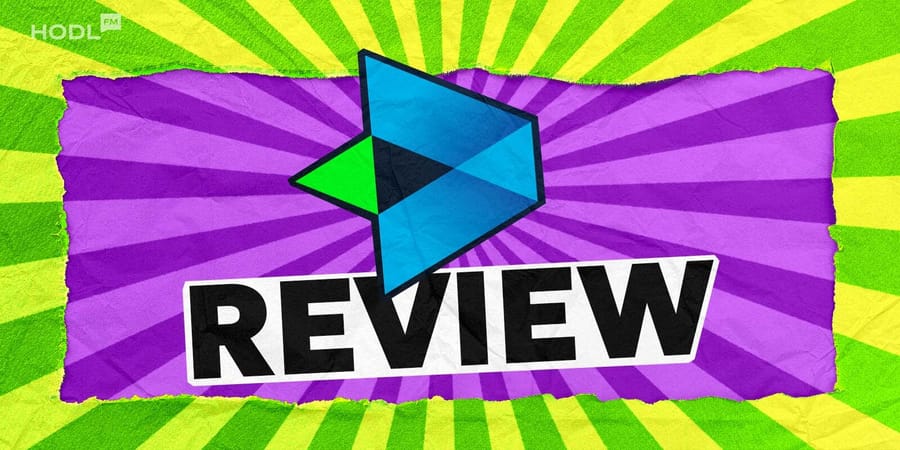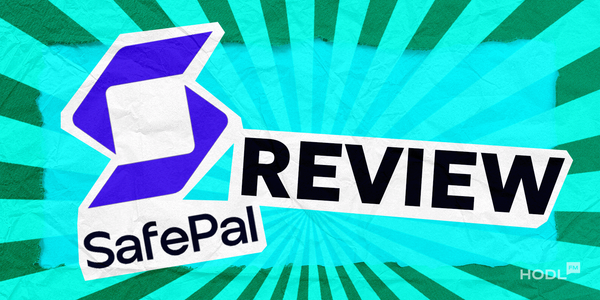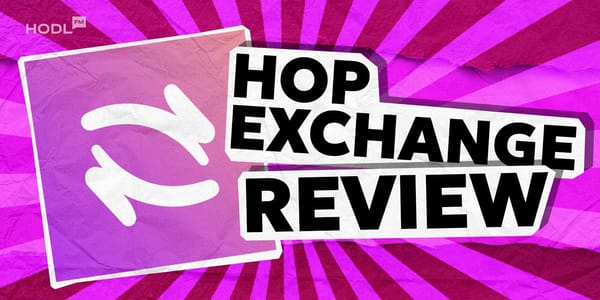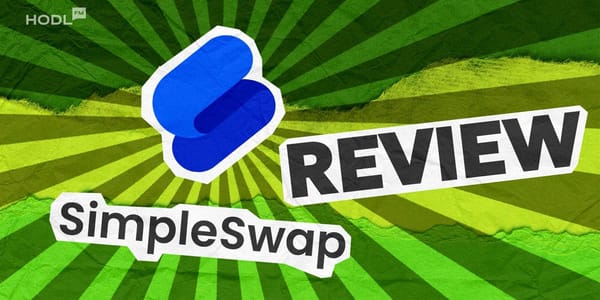The crypto derivatives market is on the rise. Daily trading volumes are up 16% compared to last year, with perpetual contracts making up 78% of the total. New products like Solana and XRP futures, along with expanded Ethereum ETF options, show that crypto derivatives have become a core part of global trading strategies. And simply trading derivatives is the “real” trading that brings adrenaline, FOMO, and even a bit of addiction.
Today, we’ll take a look at Delta Exchange, an India-based platform that focuses entirely on derivatives. The article walks through the interface, fees, and security, and also touches on the surprising user feedback. Let’s move on.
What Is Delta Exchange?
Bet you thought all crypto trading platforms worked the same way? Not quite. Some platforms let you buy and hold coins directly, while others specialize in more advanced financial tools. Delta Exchange belongs to the second group because it’s a centralized cryptocurrency exchange that allows trading with derivatives. Currently, it supports 50+ cryptocurrencies and altcoins.
There are two separate Delta Exchange entities:
- Delta Exchange India is built specifically for Indian users and registered with the state financial regulator. Instead of depositing crypto, you can deposit only (!) Indian Rupees.
- Delta Exchange Global is open to traders worldwide, where you deposit crypto like BTC, ETH, or USDT and trade derivatives.
Delta Exchange was launched in 2018 by Pankaj Balani, Jitender Tokas, and Saurabh Goyal. It started out in Singapore and is now registered in St. Vincent and the Grenadines.
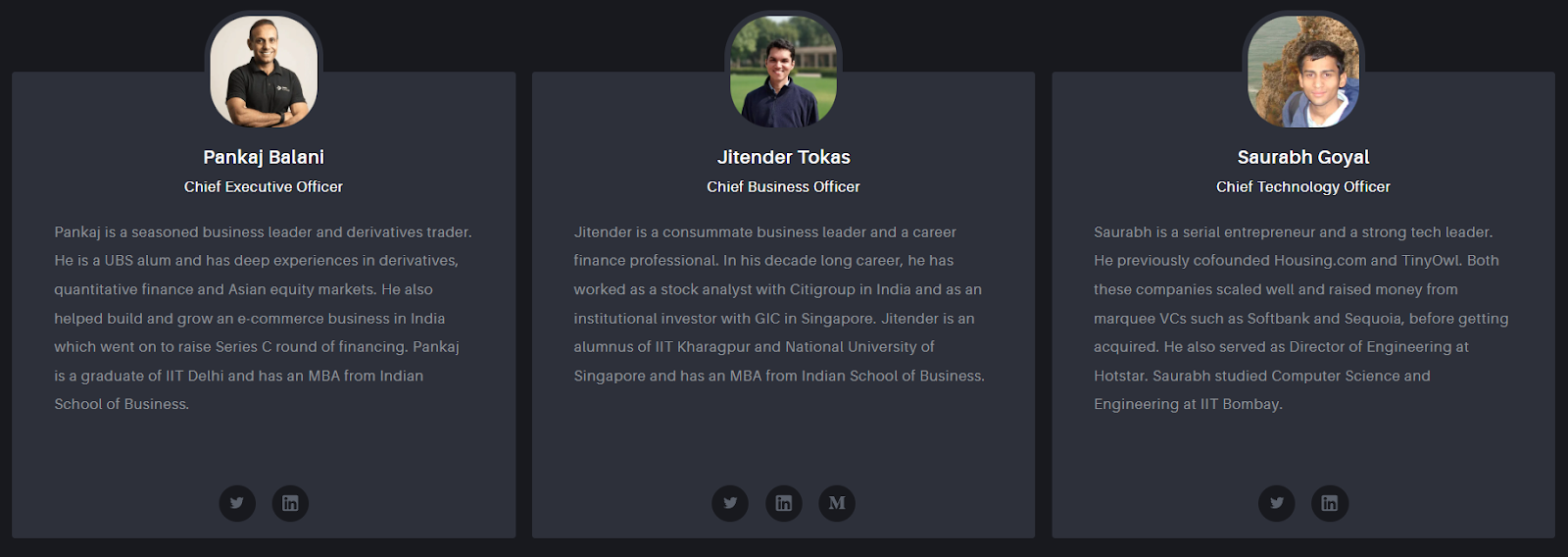
Spot trading is also available on Delta Exchange but it's very limited. The platform offers only six spot pairs:
- BTC/USDT
- ETH/USDT
- SOL/USDT
- XRP/USDT
- USDC/USD
- DETO/USDT
User Interface and Experience
So, what’s it actually like to trade on Delta Exchange? The platform offers different experiences for desktop, mobile, and even practice trading. Let’s walk through each.
Desktop Platform
On desktop, Delta Exchange presents a clean and professional interface. Navigation is straightforward, no million buttons like Binance has. The main menu at the top clearly separates Options, Futures, and Spot trading.
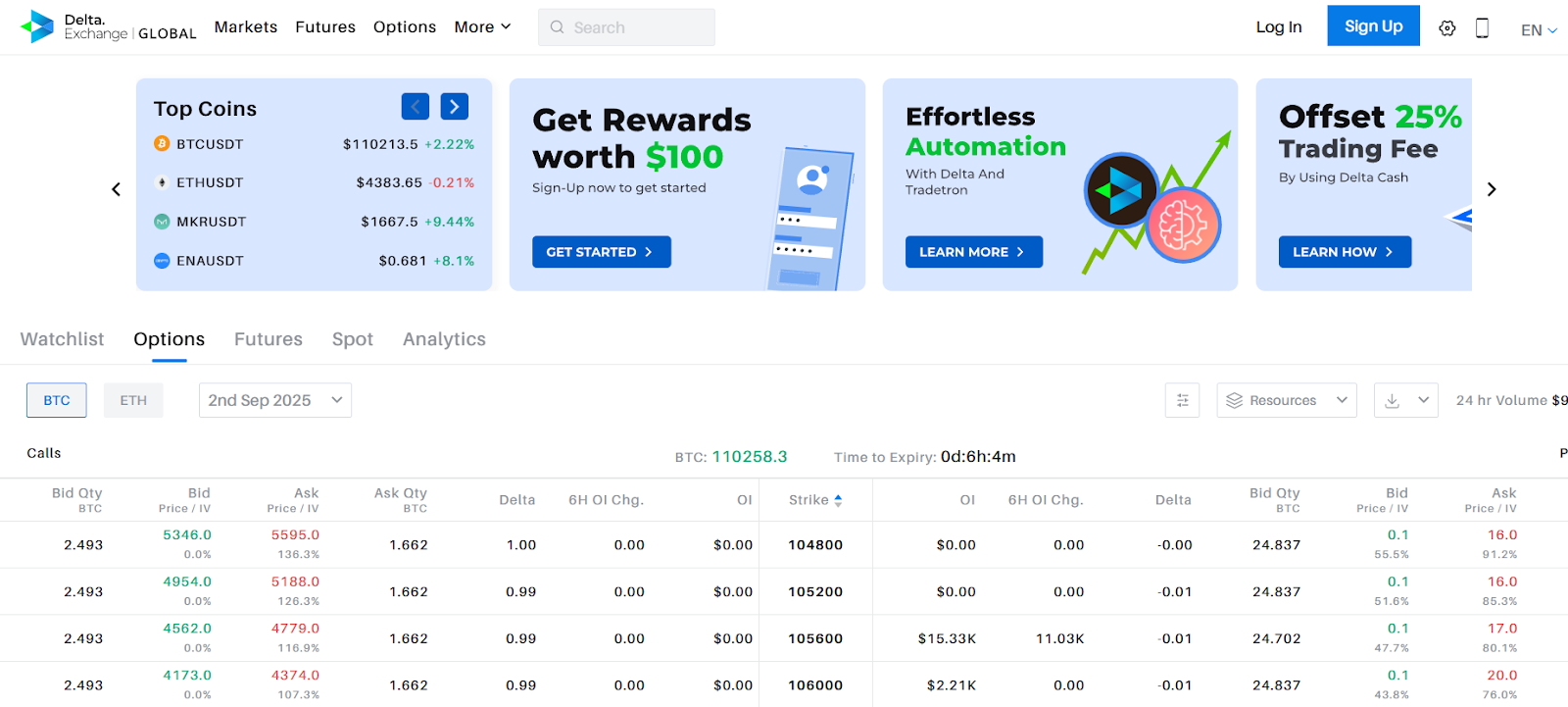
Mobile App
But what if you're on the move? The Delta Exchange app download is available for both iOS and Android devices. It mirrors much of the desktop functionality: you can still trade derivatives, track your portfolio, and even set price alerts with push notifications. Besides, the Delta Exchange India app provides the same security features as the web platform.
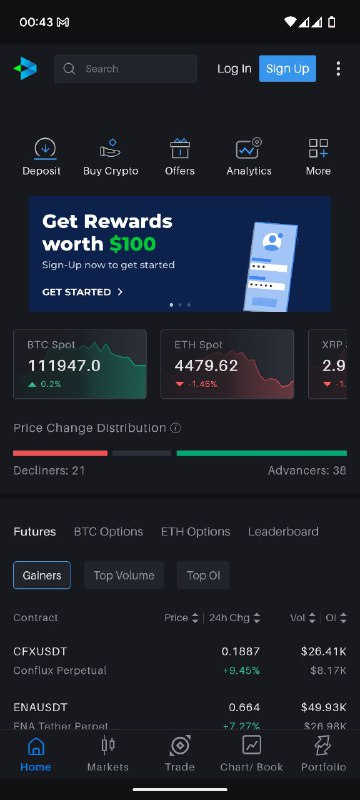
Demo Trading Platform
And here’s a feature that’s especially valuable for beginners - a demo trading. Think of it as a sandbox where you can practice strategies without risking real money. However, the demo account is only available on the web platform, not in the mobile app.
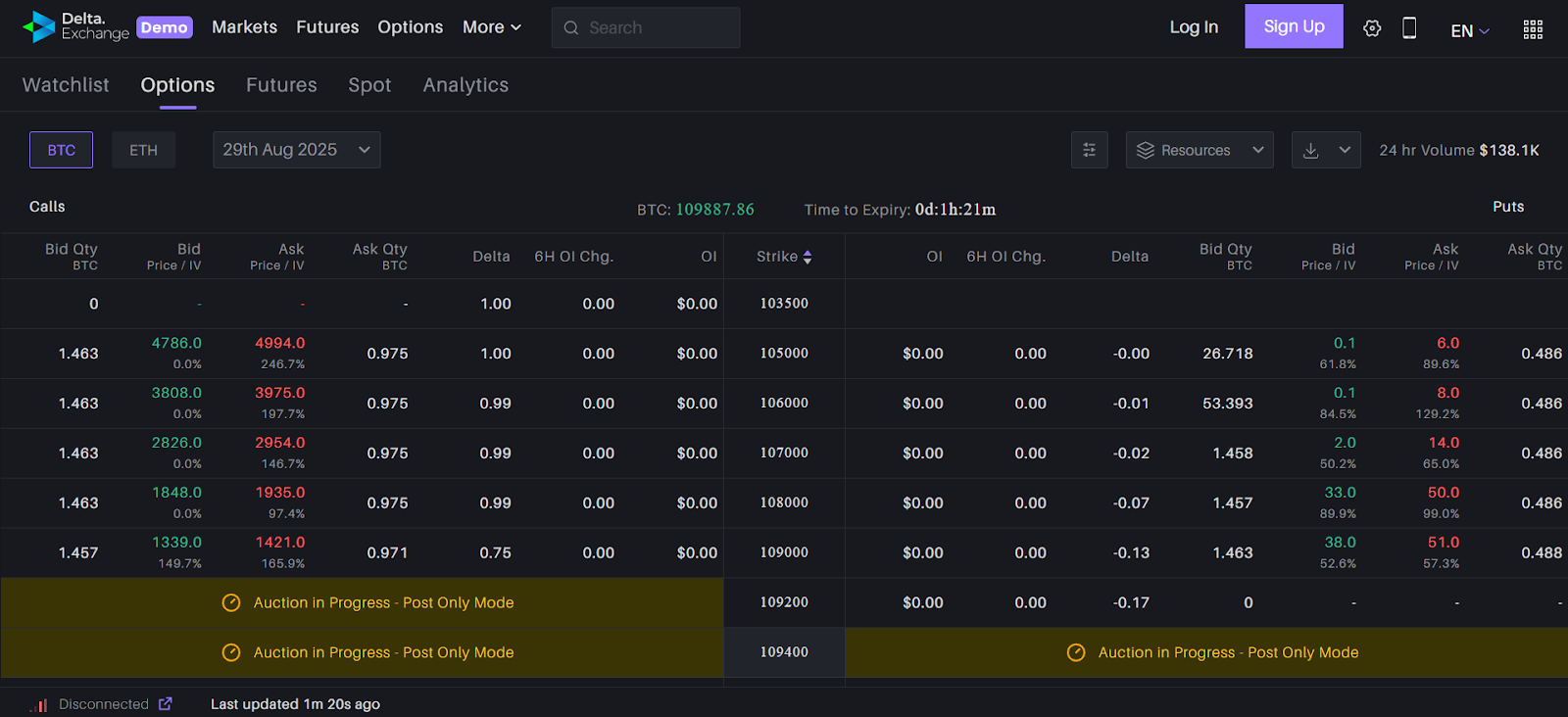
Security
When it comes to crypto trading, security is just as important as the trading tools themselves. As stated on the official website, Delta Exchange has enterprise-grade security and stores crypto in multi-sig wallets. For additional protection, withdrawals are processed only once a day with manual review.
Fund Security
User funds are stored in multi-signature cold wallets, which means they’re kept offline and need multiple approvals before any transfer. Since the wallets aren’t connected to the internet, they’re much harder to hack.
Account Protection
User accounts are protected through several mechanisms:
- Two-Factor Authentication (2FA): Mandatory for all accounts
- Anti-phishing codes: Users can set custom codes to verify authentic emails
Insurance Fund
To prepare for extreme market swings, the platform keeps an Insurance Fund. This fund covers losses when the market moves too fast and a trader’s position can’t be closed in time. It helps prevent traders from going into debt and keeps the platform stable. It covers up to 5% of losses.
Regulatory Compliance
In India, Delta Exchange operates under Financial Intelligence Unit (FIU) registration, which ensures it follows local AML and KYC rules. Every user must pass basic KYC before trading, while Level 2 verification is recommended for higher limits and added benefits.
Delta Exchange Trading Fees
Understanding the fee structure can seem boring and unnecessary. However, if you want to succeed, you have to calculate your potential profits and costs. The platform employs a maker-taker fee model that varies based on trading volume and contract type.
Futures and Options Fees

Deposit and Withdrawal Fees

Delta Exchange Fees Calculator
Is the game worth the gamble? Won’t the fees turn out to be higher than the margin? You can check this with the Delta Exchange brokerage calculator. To use it, go to the Delta Exchange India login page, scroll down to the “Information” section, and find “Fees.”
Users can select contract types, adjust maker/taker positions, and specify trade sizes to calculate exact fees.
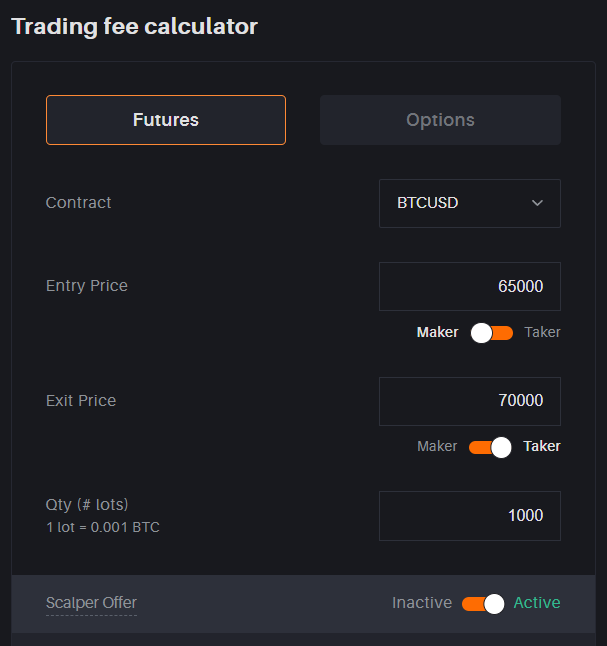
How to Start on Delta Exchange
Delta Exchange makes onboarding simple, whether you’re joining the global platform or the Indian version.
- Create your account. Go to the Delta official website and hit “Sign Up.” Enter your email and set a secure password, or register quickly using Google or Apple. During sign-up, you’ll need to select your country of residence.
- Access Your Account. After registration, you can proceed with Delta Exchange login through the main website.
- Verify your identity. Basic KYC is required for all users. You’ll upload a government-issued ID and proof of address, then wait for approval (usually 24-48 hours). If you want higher limits and extra features, complete Level 2 KYC for enhanced benefits.
- Secure your account. As soon as you’re in, enable two-factor authentication (2FA). Add an anti-phishing code so you can spot official emails at a glance, and consider IP whitelisting for extra control.
- Add funds. Global users can deposit crypto by choosing the asset (BTC, ETH, USDT, etc.), selecting the right network (ERC20, BEP20, TRC20), and sending funds to their unique deposit address. Indian users can link a bank account, deposit INR through supported payment methods, and trade derivatives directly.
- Place your first trade. Head to the Markets section and choose Futures, Options, or Spot trading. Select your pair, review contract details, and set your trade parameters: position size, leverage, and order type (limit or market). Add stop-loss and take-profit levels for risk management. Once you’re ready, confirm your order and track it under “Open Positions.”
Pros and Cons of Delta Exchange
Nothing in life is perfect; everything has its drawbacks. You’ve probably already noticed a few when it comes to Delta Exchange.
Pros
- 50+ futures, options, and perpetual pairs with leverage up to 100x
- Demo-trading
- Automated strategies as built-in robo-trading tools like momentum and arbitrage
- Strong security with multi-signature cold wallets, and an insurance fund
- Regulatory compliance in India
- Maker fees as low as 0.005% and no deposit fees
Cons
- Limited regional access for the U.S., U.K., Canada, and several other countries.
- Only six spot pairs on sport trading
- Deposits/withdrawals allowed only on specific blockchains
- No fiat on the global platform
Delta Exchange Reputation & Customer Support
Customer support seems to be one of the biggest pain points with Delta Exchange. A lot of users complain about slow or even non-existent responses. Besides, support itself is limited to online chat and tickets. There’s no phone line.

On Trustpilot, the platform sits at a pretty low score — around 1.7 out of 5. Most of the negative reviews mention unresolved deposit issues, blocked communications on social media, and the feeling that support doesn’t really offer solutions. Some people even reported problems like liquidations, failed orders, or technical glitches during volatile markets that led to financial losses.
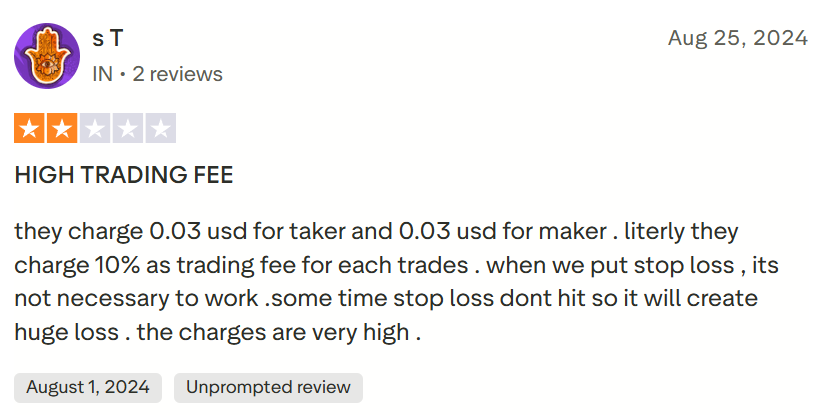
The mobile app reviews are mixed. Some users say the mobile app works fine and is easy to use, but plenty of others complain about bugs, lag, and issues with order execution.
Alternatives to Delta Exchange
If Delta Exchange isn’t the right fit, there are plenty of other platforms traders look at. Binance is the giant with biggest volumes, tons of coins, spot and derivatives, and support for multiple fiat currencies. It’s basically the one-stop shop for most traders.
Bybit leans heavily into derivatives and high leverage. It’s got a slick mobile app and is especially popular in Asia, though it doesn’t have the same fiat options Binance does.
If you’re really into options trading, Deribit is the go-to. It doesn’t have a huge list of coins, but for Bitcoin and Ethereum options, it’s considered the gold standard.
Then there’s BitMEX, one of the old-school players in crypto derivatives. It’s still known for deep liquidity on Bitcoin and complex strategies.
Should you choose Delta Exchange?
Delta Exchange is a good fit for traders interested in derivatives such as futures, and options. It also takes security and compliance seriously, particularly in India. However, it’s less suitable for U.S. users, beginners, or those mainly looking for spot trading. Overall, it works best for experienced traders in supported regions, while platforms like Binance or Kraken may be better for broader access and simpler trading.
FAQs
Where is Delta Exchange located?
Delta Exchange is officially located in St. Vincent and the Grenadines. Today, the platform operates globally with versions tailored for different regions.
Is Delta Exchange legal in India?
Yes, Delta Exchange is totally legal in India. It's registered with the FIU and follows India’s anti-money laundering and cryptocurrency rules.
What do “maker” and “taker” mean on Delta Exchange?
A maker is a trader who places a limit order that doesn't fill immediately. By doing this, they add liquidity to the market. Makers usually pay lower fees (sometimes as low as 0.02%).
A taker places a market order (or a limit order that fills right away) and therefore removes liquidity from the market. Takers pay slightly higher fees (around 0.05%) for the convenience of immediate execution.

Disclaimer: All materials on this site are for informational purposes only. None of the material should be interpreted as investment advice. Please note that despite the nature of much of the material created and hosted on this website, HODL FM is not a financial reference resource, and the opinions of authors and other contributors are their own and should not be taken as financial advice. If you require advice. HODL FM strongly recommends contacting a qualified industry professional.
